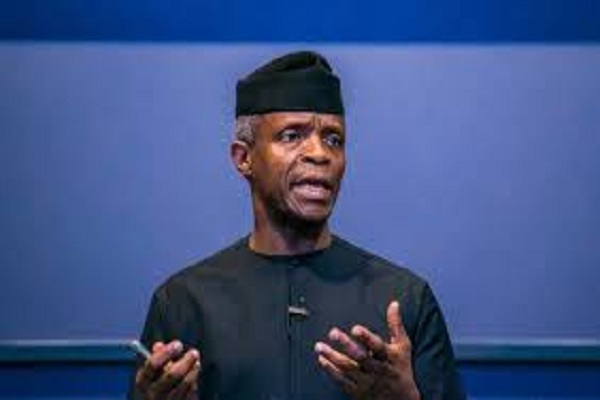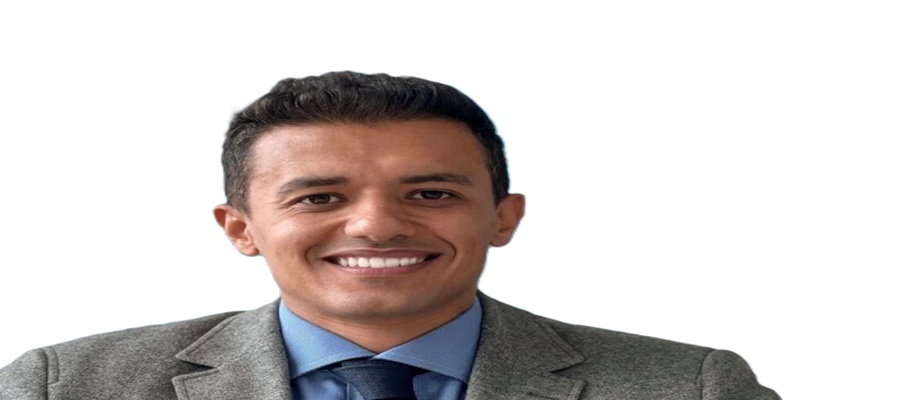Telecom
Startups Ecosystem Critical to the Future Of Nigeria – Osibanjo

Professor Yemi Osibanjo, Vice President of Nigeria has said that startup ecosystem is one of the vital tools in finding solutions to Africa’s various challenges, according to him, these challenges will determine if the continent’s future as the next frontier for economic opportunities will fully be realised.

The VP, represented by Director General, National Information Technology Development Agency (NITDA), Mallam Kashifu InuwaAbdullahi, said this at the Startup and Developer event organised by Google.
He stated the topic – The African Start-up Ecosystem Opportunity – is exciting because startup ecosystem is extremely critical to the future of Nigeria and Africa at large.
“Globally, the Startup ecosystem is the most viable platform for innovators and entrepreneurs to take their ideas from inception to impact. It brings relevant stakeholders together to collaborate and bring something new to the world or new to an industry.
“There will never be a more perfect time to strengthen the African startup ecosystem than now, on the verge of the 4th industrial revolution,” he said.
Osibanjo noted that the 3rd industrial revolution was pivotal to unprecedented global economic growth in the 21st century, as it disrupted traditional service delivery channels and accelerated the automation of factories and manufacturing processes, using electronics and information technologies to expand the reach and create prosperity but Africa hopped along and missed out.
“The countries that captured maximum value from the 3rd industrial revolution have become more prosperous and built solutions that improved service delivery in all aspects of lives, from education, healthcare and food production to efficiency and speed in manufacturing.
“Today, Africa is presented with another opportunity, the 4th industrial revolution, which is shaping and creating economic activities. It is proving to be the catalyst for future economic activities that will bridge the divide between rich and developing countries, and remove physical borders and barriers while maximising the utilisation of digital technologies as a source of inspiration across economic sectors,” he added.
“The African startup ecosystem opportunity is hinged on two key factors, which are anchored on the 4th industrial revolution and driven primarily by digital technologies. The first factor is innovation capacity, and the second one is entrepreneurial capacity. Both capacities depend on four key indicators, Human Capital, Infrastructure, Funding and Demand.
“Human capital being the first indicator means that African startups must realise that they are only as strong as the value of the human resources they have. Therefore, startups like Andela, Wootlab Innovations and Decagon are vital as they are involved in producing skilled talent.
“With this, Africa can become the next hotbed for professional talent that will provide local solutions and export their skills and solutions to a global market that actively seeks such value. This is why we highly valued Google Developer Space in Lagos. It is the first in Africa and speaks to the position of Nigeria as a leader in the digital skills and startup ecosystem in Africa.
“The investments attracted by our startups confirm the position. Recently, Flutterwave announced new funding of $170m, and Stripe acquired Paystack for more than $200m. Other Nigerian technology companies like Interswitch have raised funding in hundreds of millions of dollars,” he noted.
The VP stated that according to startup Genome report, Lagos is the most valuable startup ecosystem on the continent, having 400 to 700 active startups valued at over $2B with Fintech being the most prominent in the Lagos technology startups ecosystem.
However, other industries are emerging with startups like Flying Doctors, 54gene, Helium Health and Life Bank blazing the trail in the healthcare sector andThrive Agric, Afex Commodities, and Probity Farmsmaking waves in the agriculture and commodities exchange space.
He said the opportunities for investment and disruption remain very high in the continent; same as the opportunity for hubs and other innovation centres to serve as enablers and anchors for our promising startups.
“As Government, we are working with the relevant stakeholders in the public and private sector to ensure that startups receive every support they require to take their ideas from inception to impact. As part of our Ease of Doing Business Reforms, we instituted the Visa on Arrival Policy which allows any person outside ECOWAS to get a visa on arrival in Nigeria.
“This policy means all African startups and entrepreneurs seeking to expand their business into Nigeria will have a more straightforward process.
“We are also re-convening the Technology and Creativity Advisory Council, made up of public and private sector stakeholders in the ecosystem to advise Government on policies and programs to support the ecosystem.
“Through the work of this council, we are currently engaging with the African Development Bank to setup a $500million US Dollar Innovation Fund, which will provide support for the ecosystem across four pillars which includeInfrastructure support, Finance, Skills Development and Technical Assistance.
“In 2019, the Federal Government of Nigeria launched the National Digital Economy Policy and Strategy (NDEPS) for Digital Nigeriaas a sustainable roadmap to accelerate the development of the Digital Economy in Nigeria.
“The policy is designed to catalyse the digital ecosystem development in Nigeria and deepen innovation qualityto promote innovation-driven enterprises that target the global market.
“We also have many initiatives to support the ecosystem through various agencies.In this regard, the National Information Technology Development Agency (NITDA) has been at the forefrontof supporting Nigeria’s digital innovation ecosystem.
“Last year, as the COVID-19 pandemic wreaked havoc worldwide, NITDA engaged the ecosystem to devise strategies to aid business continuity for startups and developed schemes to support and sustain the ecosystem.
The engagement led to initiatives such as Technology Innovation and Entrepreneurship Support (TIES) Scheme, National Centre for Artificial Intelligence and Robotics, National Innovation and Entrepreneurship Centeretc, as sustainable programmes to continuously up-skill and supports the startup ecosystem.
“Secondly, the Nigerian Export Promotion Councilintroduced the Export Expansion Grant, which can be accessed by companies with a minimum annual export turnover of N5 million. This is particularly useful to Nigerian startups seeking an expansion into other African countries and those seeking to take advantage of the African Continental Free Trade Area.
“Other opportunities, such as the Central Bank of Nigeria’s Creative Sector Loan in collaboration with the Bankers’ Committee and the Bank of Industry’s Technology Fund, are designed to create different ways through which startups can access the value they need to keep expanding their businesses.
“I must further re-iterate that there is no exhaustive list of approaches to make sure our Government creates an enabling environment.
“For example, we are working through the Federal Ministry of Communications and Digital Economy to deepen digital identity through NIN registration and build broadband infrastructure backbone across the country, this is part of our National Broadband Plan, which is designed to deliver data download speeds across Nigeria of a minimum 25Mbps in urban areas, and 10Mbps in rural areas, providing access to at least 90% of the population by 2025 at affordable prices.
“Broadband infrastructure and digital identity are two critical factors that accelerate the digital economy.These are all avenues aimed at inspiring our startups to disrupt the conventional ways of service delivery,” he concluded.
Telecom
FG Expands 3MTT Programme Across the Country

Dr Bosun Tijani, Nigeria’s minister of communications, innovation, and digital economy, has revealed that the federal government’s 3 Million Technical Talent (3MTT) programme has trained over 135,000 citizens as it moves from pilot to national level.

Tijani announced this in an update on the program’s success, stating that the beneficiaries were trained in three batches.
He also stated that the initiative’s community-based learning tools had provided over 300,000 extra learners with access to digital skills training across the country.
According to the minister, the program has also enabled the creation of about 15,000 job, entrepreneurship, and career development in Nigeria’s developing digital economy.
He further revealed that more than 1.8 million Nigerians are currently in the 3MTT pipeline, as the government works toward its target of equipping three million citizens with in-demand digital skills aligned with local and global labour market needs.
As the programme enters its scale-up phase, Tijani said the government’s focus will shift toward deepening impact rather than just expanding numbers.
Key priorities, he explained, include strengthening the 3MTT alumni community, widening access to economic opportunities and ensuring that skills acquired through the programme translate into measurable outcomes such as jobs, business creation and innovation.
To support this phase, the federal government has introduced the #3MTTImpactChallenge, an initiative aimed at assessing the programme’s real-world impact
Through the challenge, fellows and partners are invited to share personal stories on how 3MTT has shaped their professional journeys as part of a National Impact Reflection exercise.
Participants are expected to share their experiences across social media platforms, with selected winners set to receive prizes including laptops, e-tablets, data bundles and other incentives.
Telecom
Spacecoin Secures Licenses to Roll Out Satellite Connectivity in Nigeria, Kenya

Spacecoin, US-based, has announced the signing of recent agreements with local authorities and operators to launch satellite connectivity pilot projects in Africa.

The initiatives, focused on Kenya and Nigeria, aim to serve areas where terrestrial networks remain limited or unavailable.
n Kenya, Spacecoin has obtained a transmission license from the Communications Authority, allowing it to test satellite-based solutions for connectivity and Internet of Things (IoT) monitoring, particularly in rural and peri-urban areas with limited internet access.
According to the Kenyan regulator, internet penetration remains below 50% of the population, despite mobile penetration exceeding 130%.
In parallel, the company is continuing operations in Nigeria under an existing license issued by the Nigerian Communications Commission (NCC).
This authorization supports initiatives aimed at delivering affordable broadband connectivity to isolated and underserved communities.
Spacecoin’s approach is based on a decentralized satellite network using nanosatellites in low Earth orbit (LEO).
Combined with blockchain-based protocols, this architecture is intended to offer more flexible and cost-effective connectivity services than traditional networks, while also enabling the integration of IoT solutions for a range of uses, from smart agriculture to infrastructure monitoring.
These projects are part of a broader strategy to help narrow Africa’s digital divide, where a significant share of the population still lacks access to reliable internet services.
Satellite technology is increasingly viewed as a complement to terrestrial infrastructure, particularly in hard-to-reach areas where deployment costs and geographic constraints remain high.
Beyond Africa, Spacecoin is also running pilot projects in Asia, working with local partners to test the viability of its model across different regulatory and geographic environments.
According to the company’s management, growing interest from regulators reflects a shift toward solutions capable of reaching populations that have long been excluded from internet access.
Telecom
AVEVA Names Khaled Salah Vice President for Africa to Drive Growth

AVEVA, a global leader in industrial software, driving digital transformation and sustainability, today announces the appointment of Khaled Salah, 37 years old, as Vice President of Africa.

Khaled Salah
In this new role, he will be responsible for about 30 employees to ensure the successful implementation of AVEVA’s growth strategy. Khaled Salah will report directly to Jesus Hernandez, SVP of the EMEA region.
A 15-years + career across different industries and domains
With a MBA in management from the Warwick business school, UK, and a master’s degree in engineering from Ain Shams university in Egypt, Khaled Salah is an active advocate for driving sustainable progress in the industrial sector. With Sustainability in mind, Khaled is keen on making a positive business impact, while fostering progress for people and the planet.
He started his career at Schneider Electric, in 2013 in the global supply chain and evolved through various roles such as Europe procurement and supply chain strategy Manager, and Global Commercial strategy Director for the industrial automation business. Khaled Salah has developed a strategic understanding of all those fields.
After 12 years in Schneider Electric, Khaled joined AVEVA in 2022 to lead AVEVA and Schneider Electric global strategic partnership, across all industries managing a team of 30 people.
He has led the introduction of new AVEVA software solutions to initiate and develop significant growth areas across all Schneider Electric verticals.
Ambitious plans for AVEVA in Africa
In addition to his current role as AVEVA and Schneider Electric partnership Vice-President, Khaled now takes over the management of AVEVA’s activities in Africa.
Jesus Hernandez, SVP of the EMEA region says: “Africa is a strategic region for AVEVA. In this major industrial market, customers, world leaders in the fields of Energy, Metal & Mining, Chemicals, and Water, are looking for AVEVA’s expertise to accelerate and drive their digital transformation and sustainability strategies, as well as their energy transition projects.
“Khaled Salah’s qualities of leadership in a global environment will benefit his team spread across 12 countries including Algeria, Morocco, Egypt, Kenya, Nigeria, and South Africa.”
Motivated by the prospect of capitalizing on the talent of his team to strengthen AVEVA’s presence in Africa in the years to come, Khaled Salah says: “Helping my team realize their professional potential is close to my heart.
“We will work together to support and accelerate the digital transformation of industries in Africa, in particular through CONNECT, our industrial intelligence platform, with the support of our ecosystem of partners. »

 General News2 days ago
General News2 days agoCybersecurity Firm Detects a Wave of Crypto Phishing Following BlockFi Bankruptcy

 News2 days ago
News2 days agoIMF Upgrades Nigeria’s 2026 Growth Projection to 4.4%

 Telecom2 days ago
Telecom2 days agoNCC Unveils Spectrum Roadmap to Power Nigeria’s $1tr Digital Economy

 Telecom2 days ago
Telecom2 days agoNCC Gives Amazon’s Kuiper, BeetleSat Nod to Provide Satellite Broadband Services in Nigeria

 General News2 days ago
General News2 days agoFG Rejects Northern Elders’ Gold Refinery Siting Claim

 News2 days ago
News2 days agoNew Horizons Invests N50m to Empower Almajiris with Skills

 General News2 days ago
General News2 days agoUniversal Insurance to Raise N15bn to Meet Capital Rules

 E-Financial2 days ago
E-Financial2 days agoKongaPay K-Save Users Save over N3.2Bn



























